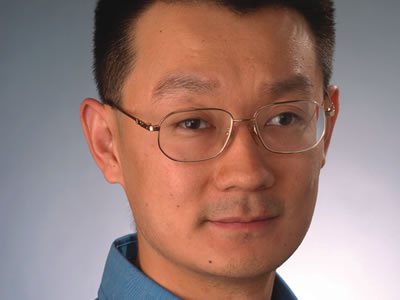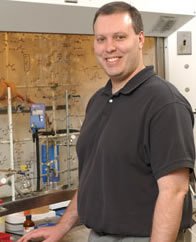Syracuse Chemists Awarded Grants for Interdisciplinary Research
Professors Yan-Yeung Luk, John Chisholm redefine possibilities of organic chemistry

Two chemists in Syracuse University’s College of Arts and Sciences have been recognized for their ongoing work in organic chemistry and the life sciences.
Yan-Yeung Luk and John Chisholm, associate professors of chemistry, have received major grant awards from the National Science Foundation (NSF) and the National Institutes of Health (NIH), respectively. Luk is using his $355,800 grant to study the chemical biology of mammalian cells and bacteria. Chisholm has been awarded $318,200 to explore synthetic approaches to pyrroloindoline natural products, whose properties include antitumor and antibacterial activities, and may have therapeutic value in Alzheimer's disease.
“Professors Luk and Chisholm exemplify the College’s commitment to cutting-edge, collaborative research,” says Jon Zubieta, Distinguished Professor and chair of chemistry. “As members of our Organic Chemistry Group, they work at the nexus of biological, physical, and inorganic chemistry. Much of their research involves the development of new methodologies, as well as new techniques in chemical analysis.”
Luk’s NSF project seeks to chemically control the bioactivities of microbes in well-defined materials and environments, shedding light on the molecular scale beyond empirical observations and applications. His research group has developed and validated a new class of molecules that controls how bacteria attach to surfaces to form biofilms and metamorphose into disease strains. ("Imagine tadpoles turning into frogs," he says of the transformation process.) To understand how these molecules work, Luk's group will use a new type of hydrogel material that absorbs large amounts of water and presents drug targets in a "clean" environment, enabling them to study the binding, or attractive interaction, of these new molecules.
“This gel-like environment not only mimics living tissue, but also removes unwanted molecular interactions, allowing us to see how our potential drugs really work,” Luk says. “Our approach is largely hypothesis-driven, but we also enjoy a significant amount of discovery-based science.”

Like Luk, Chisholm is an organic chemist whose research involves synthesis and catalysis. (Synthesis is the production of complex molecules from simple building blocks; catalysis is the use of small amounts of a secondary agent to accelerate a chemical reaction.) Chisholm's NIH grant supports research into new methods for the synthesis of pyrroloindoline alkaloids, an important class of structurally complex natural products that contain multiple nitrogen atoms.
“By developing new synthetic routes to complex molecules like pyrroloindolines, we hope to gain a better understanding of which sections of the [alkaloid] structure are responsible for interesting biological activity," says Chisholm, whose research also involves medicinal chemistry. "Through synthesis, we can optimize these small molecules for the desired properties, and try to minimize any unwanted side-effects.”
Natural products, he adds, are traditionally a rich source of therapeutic agents and pharmaceutical candidate molecules.
Both grant awards are designed to support meritorious research, expose graduate and undergraduate students to research, and strengthen the research environment of the University.
